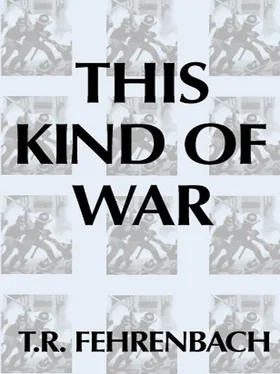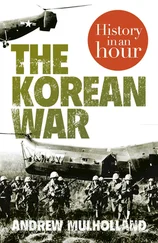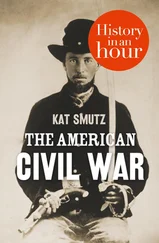Wayne Clark, putting away the golden pen the Parker Company had sent him specially for the signing, said: "I cannot find it in me to exult in the hour.… If we extract hope from this occasion, it must be diluted with recognition that our salvation requires unrelaxing vigilance and effort."
Now, to the units along the line came the words, "Shoot 'em up, boys—it's done!"
In a burst of wild enthusiasm—yet restrained, in many men, as it was in General Clark, by a certain sadness—the U.N. units burned up what ammunition they had on the ground.
For the last time—all men hoped—the dark Korean hills rocked with flame and noise.
Then, twelve hours after the pens scratched at Panmunjom, the hills lay quiet. At sea ships put back from the cold gray waters off North Korea, and the silvery aircraft stood silent on their fields.
There was no more war—but there was no peace. There was no victory.
It was called cease-fire.
At Prisoner Camp Number 4, Wewan, Sergeant Charles Schlichtef had been handling sick call for POW Company 1 since August 1952. He had Turks, British, French, Niseis, and Puerto Ricans, with all of whom, in varying degrees, he had made friends.
With some of the Turks, especially Beli Hassan, and Hilmi Andranali, the sergeant who interpreted for him with the Turks, while Schlichter spoke to the Chinese doctors in English, he became very friendly.
He could never fail to admire the iron discipline and fierce pride the Turks exhibited in the face of the CCF. Years later he would still correspond with some of these men, and from both the Turkish and British governments he would receive commendations for his work with their nationals.
As the days went by, as each morning Turks came in to greet him gravely with, " Nasa-san, Akadash "—How are you, my friend?—it seemed that captivity would never end. There was no news—but living conditions had improved. Gradually, the Chinese were fattening the POW's up; most of whom were now approaching good health. Most of the POW's felt there must be a reason, and the reason had to be good.
Schlichter could not know that in California an officer had called on his wife to offer her Schlichter's GI insurance benefit, and his death gratuities. Schlichter had been listed as missing in action for two years, and the government was willing to pay. In tears, Elizabeth Schlichter refused.
She told the officer that her husband had told her to stay where he had left her, that no matter what, he would come back. In the absence of everything else, she had only this to cling to. Somehow, alone of all those who had known him, she would not believe him dead.
But suddenly, in April 1953, a number of prisoners were selected to be repatriated, on Little Switch. These were supposed to be the sick and lame, on each side—but the Communists selected mainly men who had no right to go out on those terms; a large number of them were "collaborators."
It was Communist policy to hold the "reactionaries"—of which Schlichter was one—to the last.
Schlichter and most of the men at Wewan knew nothing of what was hap- pening at Panmunjom, and elsewhere, that long spring and summer of 1953.
And then, suddenly, out of a clear sky, they were told, "You're moving." They were taken south to a large collecting point, where hundreds of U.N. prioners of war were being gathered.
Schlichter saw truckload after truckload of men hauled south from the col- lecting point—but he was told nothing.
On 6 September 1953, in the morning, he and the men about him were ordered to board a truck. One man suddenly had an intense anxiety reaction; he shouted and broke into a run, and ran headlong into a pole, knocking himself out.
Schlichter asked an English-speaking Chinese doctor to help this man. It was only when the Chinese shrugged and said his own people would take care of him that Schlichter realized what was coming.
He could never adequately describe how he felt when he knew he was going home.
At 1100 his truck pulled up at Panmunjom, the last convoy of American POW's to be exchanged. A huge, moustached Marine master sergeant walked up beside the truck, called out: "I will call out your last name. You will answer with your first name, middle initial, and Army serial number—"
"Schlichter!"
Schlichter barked out his response, and stepped down.
"Sergeant," the big Marine said gravely, "glad to have you home."
"Fella, you don't know how glad I am," Schlichter said.
One by one, the last 160 American POW's passed through Panmunjom. These were all men who had been marked as "war criminals" by the enemy—and each of these criminals, before he went on to the tables of fruit juice, milk, and ice cream, glittering in the background, in one way or another, on his knees or otherwise, thanked God that he had returned.
General Mark W. Clark was there to greet them.
In this way, Sergeant Charles B. Schlichter, United States Army, returned home. He had done his job. It had taken him 1,010 days to do it.
On 23 September 1953, with the Korean War already largely forgotten by the people, Schlichter's ship lay just outside San Francisco harbor. It was a cold and dreary day, the Pacific fog thick. But the POW's returning home crowded the decks, straining to see.
Then the Master's voice boomed over the horn: "Gentlemen, if you will all look forward, you will see something you never thought to see again—"
And the fog rolled back, and they saw the Golden Gate.
There was an Air Force band on the dock, playing "God Bless America." Men who had spent a thousand days and nights in Communist prison camps did not think it was corny. Every man Charles Schlichter could see through his own misty eyes was crying.
The whistles blew, and the band whumped and boomed, and on the dock he saw Elizabeth.
Some men, no matter how fate deals with them, are fortunate.
As the truce terms provided, within ninety days of cease-fire all POW's had to be screened and repatriated, or otherwise disposed of. After Big Switch was officially finished, evidence in American hands indicated that the Communists still held 3,404 POW's, 944 of which were Americans.
The Chinese said they would not repatriate 320, for various reasons. And for various reasons, twenty-three Americans chose to stay with their captors. In neither case was the American Government able to do anything.
Of the 132,000 Korean and Chinese military POW's taken by the U.N. fewer than 90,000 chose to return home. The Koreans were settled in the Tae-han Minkuk, and some 13,000 Chinese went singing and chanting to Taiwan.
Each Chinese or Korean who refused repatriation was screened by a neutral commission at Freedom Village, Panmunjom, and his own people allowed to persuade him, while the Indian Army stood guard.
Watching the Communist tactics, the Indian Army became decidedly anti-Communist, whatever the notions of its government. The Indians had to fly in and out of the Demilitarized Zone—causing the U.N. Command considerable difficulty—since Syngman Rhee refused to allow one Indian soldier to set foot on South Korean soil.
Among the thousands of Communist POW's on Koje-do had been 474 North Korean female personnel, and the girls had been among the worst of the lot. At about the time Charles Schlichter and his comrades were coming home, these women were put on a South Korean train and sent north to Freedom Village for repatriation. On the way, they broke out Communist flags, and screamed and yelled at the gaping South Koreans alongside the tracks.
As they neared Panmunjom, they began to tear off their capitalist-made and imperialist-issued clothing, to return home in Communist purity. Then they screamed and shrieked and ripped and tore up the train seats. They urinated on what they could not destroy.
Читать дальше












